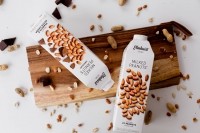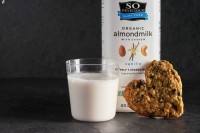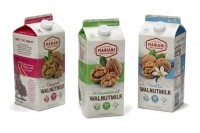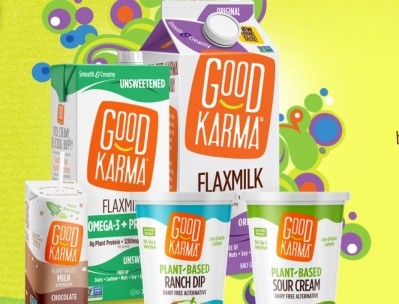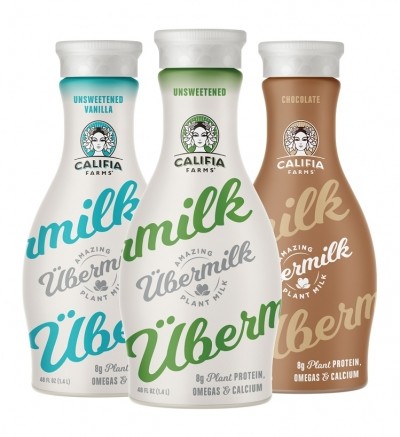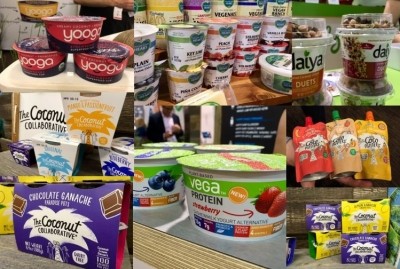SPINS data: Who are the winners and losers in the plant-based milk category?
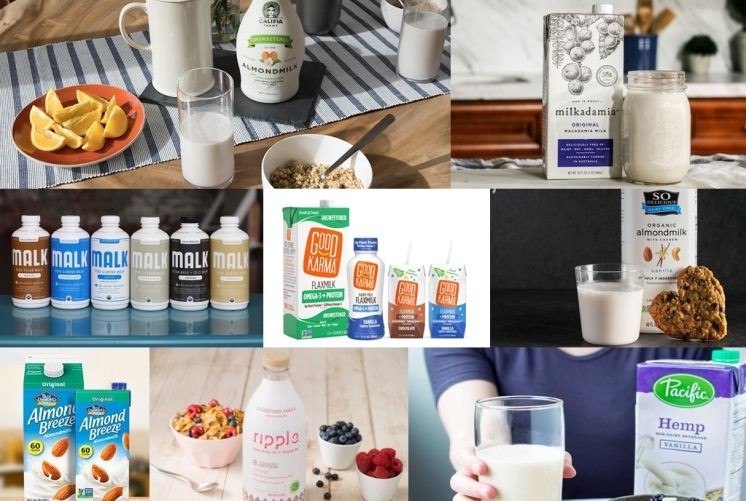
Coconut milk sales rose 5.2% in the refrigerated case and 3.3% in the shelf-stable aisles, while rice milk sales were down 5.6% in the refrigerated case and down 3.7% in the shelf stable aisles.
However, the strongest growth came from ‘other’ plant-based milks (which spans everything from more recent entrants such as cashew and walnut milk to pea, hemp, quinoa, oat and flaxmilk) and ‘blends,’ which includes products such as almond-and oat-milk blends (but excludes things such as almondmilk and cold brew coffee blends).
Total refrigerated plant-based milk sales were up 7% to $1.61bn (the figures exclude online sales, convenience stores and some other channels, as well as key retailers such as Whole Foods, Costco, ALDI and Trader Joes, so the category size is likely much larger); while shelf stable sales were up 4.7% to $229m, said SPINS' Jill Failla.
"Almond milk is still selling well, but it’s certainly not immune from other plant-based milks stealing share in the coming years... I think there’s great opportunity for coffee and plant-based milk blends, which allow consumers to purchase one item instead of two in many cases."
Plant-based milks: The third wave?
In the almondmilk sphere, brands are carving out a variety of niches, Billie Thein at New Barn told FoodNavigator-USA, with some focusing on shorter, cleaner, labels (Elmhurst Milked, MALK, Three Trees), some on higher nut content (New Barn), some on an organic and clean label positioning (New Barn, MALK, selected So Delicious and Califia lines) and others on offering added protein, functionality or flavor.
“We conceived the New Barn business in 2014 [which is now in around 4,000 stores from Safeway to Whole Foods and penetrating the foodservice channel with its barista blends] when we were consulting for a dairy company and we saw Califia Farms step into the plant-based milk 2.0 position with better packaging and a cleaner label,” said Thein.
“But we thought that we could offer something new by developing an organic product with a higher percentage of nuts. I think we’ve seen these ‘third waves’ in coffee and chocolate and water and now you’re seeing this in plant-based products as well.”
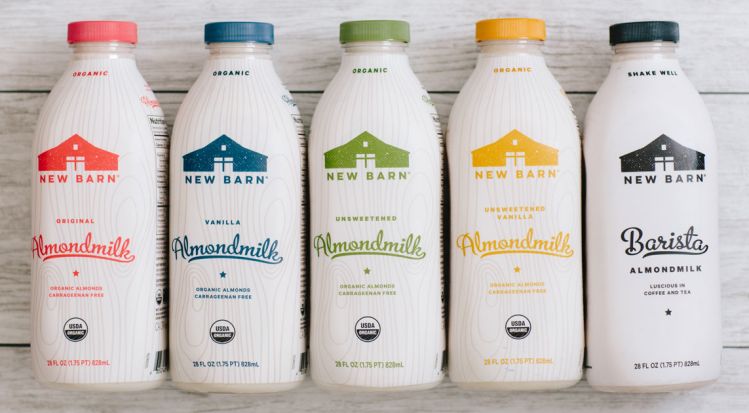
New Barn almondmilk: Three times as many nuts as leading brands
New Barn is not fortifying its almondmilk with protein powders, and boasts a higher protein content than rivals (3g vs 1g) simply because it uses three times as many nuts, he claimed. “Consumers want healthful fats and great taste, and the taste comes from the almonds and maple syrup, not natural flavors, which often aren’t very natural at all.”
But consumers do not necessarily expect nutritional equivalency with dairymilk, argued Thein. “Consumers don’t expect the same nutrition facts panel, and they are reading labels and making their own choices. And if you want more protein there are options available, so I don’t think brands within the plant-based space need to set up bogeymen within the category to promote their own products.”
"We are excited to be on-board the plant-based train, because we don’t believe it is a short-term trend. Dietary habits are changing, and the dairy portion of the pie will continue to decrease.
"At the same time, not all plant milks are made equal... Given our unique process, we feel we will be the leader in the premium, plant-based space. Our simple message, clean ingredient deck, and nutritional transparency are resonating emotionally with our consumers.
"There are so many possibilities to build upon this. We’ve broken new ground with our peanut-based products, expect to be particularly in successful with our Milked Oats, and have plans for many more new products that will be unique in the marketplace."
Peter Truby, VP marketing, Elmhurst Milked
"As the category continues to expand, more consumers are looking for unique options within the plant-based milk category. Good Karma is
growing significantly faster than the overall category as consumers are attracted to the brand’s unique nutritional benefits of omega-3s and pea protein, allergen friendly positioning (no nuts or soy), and versatile and neutral taste profile."
Doug Radi, CEO, Good Karma Foods
Almond Breeze: Double digit growth
Almond Breeze - the #1 almondmilk in the refrigerated and shelf stable categories - generated sales of $514m in the 52 weeks ending May 28 (IRI MULO data), and grew by 12.9% over the past year, Suzanne Hagener, director, brand marketing, non-dairy products, at Blue Diamond, told FoodNavigator-USA.
And while the brand has been around for 20 years, it is still attracting new consumers, claimed Hagener.
“Almond Breeze sees growth opportunities behind attracting new consumers to the franchise in the next few years… While many Almond Breeze consumers have used the product for years, some are just discovering that it cannot only be used in cereal and smoothies, but also for cooking and baking.”
So Delicious, a dairy-free brand owned by Danone North America, says it is "pleased" with the growth of its plant-based beverages: "Our organic coconutmilks continue to grow consumption and distribution, and the recent launch of our organic amondmilk with cashew in a plant-based bottle has helped the brand gain share while bringing new users looking for simpler foods to plant-based beverages."
A spokesperson added: "Plant-based beverages still have a lot of room to grow household penetration. As the dairy-free movement and trends like flexitarianism continue to grow in popularity, consumers will likely keep adding variety to their refrigerators, making room for dairy and non-dairy options depending on their household needs. New health benefits, increased transparency, quality ingredients, and simpler recipes will drive category growth for the foreseeable future."
Consumer purchase drivers for plant-based dairy alternatives
While flavor is still the most important attribute, consumer research from Comax Flavors reveals that a significant percentage of shoppers (36%) regularly consuming plant-based dairy alternatives cite health benefits as a key purchase driver, results that have frustrated - although not surprised - dairy industry executives, who insist that many of these products do not rival dairy in the nutritional stakes.
From an organoleptic perspective, the survey revealed high satisfaction levels for non-dairy milks, although some respondents expressed some degree of dissatisfaction about taste and texture, with 13% finding dairy free milks “too watery” and 9% citing a “bad aftertaste.”
Asked what they would like to see more of from manufacturers in the space, all shoppers wanted fewer calories and less sugar (which could equally apply to any product category), more flavor options, and a creamier taste and texture, with some non-dairy milk drinkers in particular looking for more protein and vitamins.
*The data covers the 52 weeks to April 22, 2018 and includes conventional (MULO) outlets, natural, and specialty gourmet channels, but excludes online and convenience channels and some key players including Whole Foods, ALDI and Trader Joe’s.
“While almond, coconut and soy milks remain the most popular types of non-dairy milk, other nut and plant bases are gaining traction, including pecan, quinoa, hazelnut and flax milks. Both established and new brands are taking advantage of the growing non-dairy milk segment, innovating with alternative non-dairy bases. Innovation will be a catalyst to drive the category forward in 2018 as both mainstream bases like almond and alternative plant bases offer added functional benefits and unique flavors.”
Megan Hambleton, beverage analyst, Mintel, January 2018
